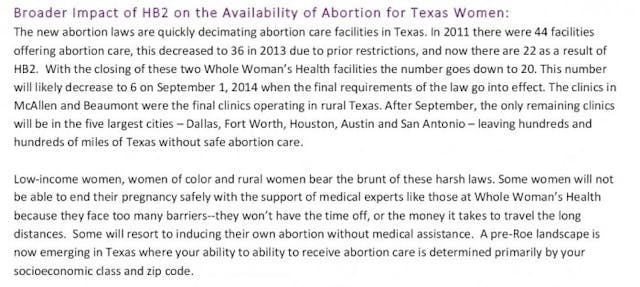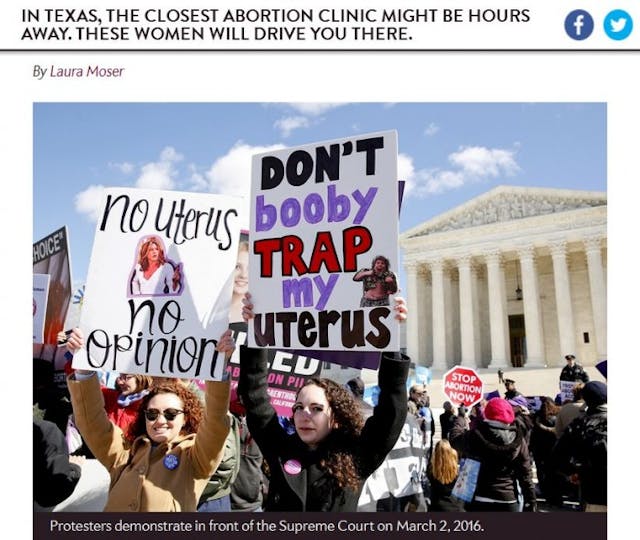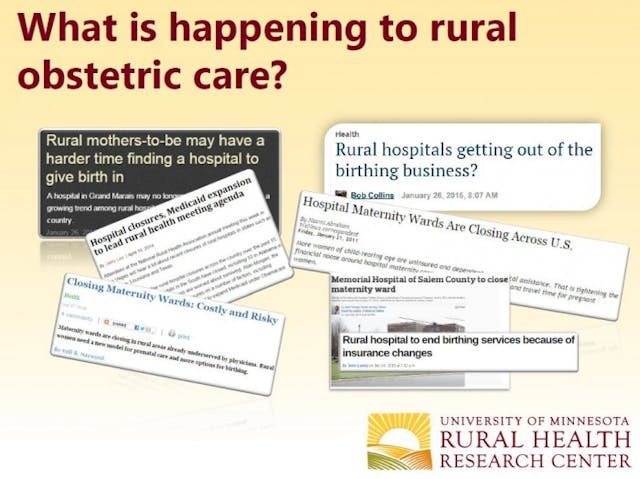
A growing number of Americans call themselves ‘pro-choice’ – but what’s really behind it?
Nancy Flanders
·
Where’s the media outrage over shortage of obstetrical care?
While we await a decision from the Supreme Court on a challenge to a Texas law which caused several substandard abortion facilities in Texas to close, many Texas women have learned that they will have to travel much further for obstetrical care.
Texas Health Presbyterian has announced that it will close its labor and delivery unit at its Kaufman Hospital. This news will not only affect workers who are now slated to lose their jobs, but is likely to negatively affect women’s health in the state.
Flashback to only a few years ago after several abortion facilities in Texas closed following sweeping pro-life legislation. From the news media and their pro-abortion allies came an uproar and constant drum beat of outrage. But where is the outrage over women being unable to conveniently access a doctor within 40 miles to safely deliver their babies?
For its part, Texas Presbyterian claims to have seen a decline in the number of women seeking their obstetrical services, which then prompted their decision to close the Kaufman OB unit in May. But less than a year after an obstetrics unit in another Texas city (Denton) closed, a neighboring hospital said they noticed a huge increase in deliveries.
“It happened literally overnight,” nurse manager Dena Shapley told the Denton Record Chronicle in March. “We were delivering around 150 to 160 babies per month, and then literally that next month we were delivering around 240 babies per month.”
In Kaufman, the closure will potentially force pregnant women to drive long distances. The limited remaining options for care are at least 40 miles away, putting women and their babies at greater risk. The closure is also ending the practice of the city’s only obstetrician.
Despite hospital officials claiming women will still have ample time to arrive at another obstetrics unit despite the 40-mile drive, a hospital nurse who spoke to Fox4 in Dallas said that typically, women who walk through the doors deliver within minutes of their arrival. Even though the hospital says it will accept women into their Emergency Room, the nurse, who pointed out that the closure will affect mostly “lower socio-economic” women, claimed that no one will be available to do an emergency C-section. The hospital responded by noting that in cases of emergencies, the women would have to be transported 40 miles by ambulance to Dallas.

Contrast this with the reactions following the closure of an abortion clinic in the state. When HB2 was passed, it did the unthinkable, so says the abortion lobby. The legislation sought to improve women’s safety by requiring doctors who work at abortion clinics to have hospital admitting privileges (like other physicians) and requiring abortion clinics to meet the same standards as ambulatory surgical centers. Live Action’s Calvin Freiburger noted that despite the abortion industry’s claim that these restrictions (which they call “TRAP laws”) are pointless, 32 medical societies seem to disagree:
While abortion advocates commonly argue that admitting privileges are medically unnecessary, 32 medical societies including the American Medical Association and the American College of Obstetricians and Gynecologists signed on to the American College of Surgeons’ 2003 affirmation that admitting privileges are an important health and safety standard.
Following the passage of the pro-life legislation, now being challenged before the US Supreme Court, the nation was exposed to a constant drum beat of criticism bemoaning the idea that women could be forced to drive for miles in order to obtain an abortion. This screen capture (below) is from abortion chain Whole Woman’s Health‘s blog. Whole Woman’s Health, known for its long history of health violations, is challenging the Texas pro-life law:
Article continues below
Dear Reader,
Have you ever wanted to share the miracle of human development with little ones? Live Action is proud to present the "Baby Olivia" board book, which presents the content of Live Action's "Baby Olivia" fetal development video in a fun, new format. It's perfect for helping little minds understand the complex and beautiful process of human development in the womb.
Receive our brand new Baby Olivia board book when you give a one-time gift of $30 or more (or begin a new monthly gift of $15 or more).

Since HB2’s passage, abortion enthusiasts have crawled out of the woodwork to decry the closures as a direct attack on their “right to abortion.” The media has been swift to measure the distance a woman might have to travel if their otherwise unfit abortion clinic were to close down. They predicted dire health consequences from the closures, none of which have materialized in the state.

Yet, in light of the Texas OB unit closing, we’ve heard only crickets when it comes to things like ‘a woman’s right to a safe and simple delivery.’ And, believe it or not, this is not a new phenomenon women are facing in the state or the nation for that matter.
According to ACOG, “Rural America” is home to 22.8% of U.S. women aged 18 years and older. Each year, about 500,000 women in the United States give birth in rural hospitals, yet easy access to labor and delivery units has been declining.

A spokesperson for the Texas Presbyterian Hospital told Fox4 that many rural hospitals have closed their OB units in past years. This includes Ennis Regional Medical Center, which discontinued obstetrics services in 2016.
According to a report, published in 2007 by the The Walsh Center for Rural Health Analysis, entitled, “Why Are Fewer Hospitals in the Delivery Business?” the number of hospitals that provided obstetric services from 1985 to 2000 dropped by 23%. As a result, more than one-third of counties in the US lacked hospital-based obstetric services in 2000, significantly more than the one-fifth of counties without hospital-based obstetric services in 1985.
A 2015 story published by NPR reported that 17 of 54 of Alabama’s rural counties have hospitals that offer obstetrics services, calling it “one of the state’s greatest healthcare challenges.” Even more shocking, a 2016 study of rural hospitals nationwide found that 7.2 percent of rural hospitals in the study had closed their obstetric units. The authors who published their findings in the January issue of Health Services Research also found that:
These units were smaller in size, more likely to be privately owned, and located in communities with lower family income, fewer obstetricians, and fewer family physicians. Prenatal care was still available in 17 of 19 communities, but local women would need to travel an average of 29 additional miles to access intrapartum care.
“The fact that closures continue happening — over time that means the nearest hospital gets farther and farther away,” Katy Kozhimannil, who co-authored the analysis told Kaiser Health News.
The disparity between outrage over a woman’s ability to access obstetric services versus abortion services in Texas (and nationwide) is glaring. It reveals that the majority of abortion defenders are more concerned about whether low-income and/or rural women can access abortion rather than having access to a place where they can safely give birth. This displaced focus also reveals that the media is lax in reporting the full story of what is happening in Texas.
While we await the Supreme Court’s decision on the Texas pro-life law, one thing is certain: the circus around abortion will continue while more life-saving obstetrics units close down.
Live Action News is pro-life news and commentary from a pro-life perspective.
Contact editor@liveaction.org for questions, corrections, or if you are seeking permission to reprint any Live Action News content.
Guest Articles: To submit a guest article to Live Action News, email editor@liveaction.org with an attached Word document of 800-1000 words. Please also attach any photos relevant to your submission if applicable. If your submission is accepted for publication, you will be notified within three weeks. Guest articles are not compensated (see our Open License Agreement). Thank you for your interest in Live Action News!

Nancy Flanders
·
Analysis
Angeline Tan
·
Analysis
Cassy Cooke
·
Politics
Madison Evans
·
Opinion
Nancy Flanders
·
Investigative
Carole Novielli
·
Abortion Pill
Carole Novielli
·
Investigative
Carole Novielli
·
Human Rights
Carole Novielli
·
Abortion Pill
Carole Novielli
·
Investigative
Carole Novielli
·